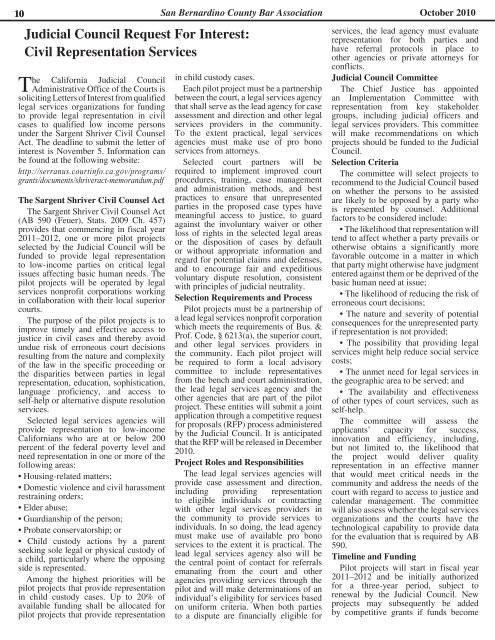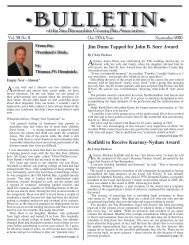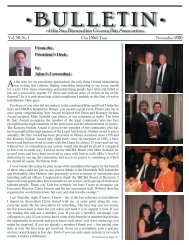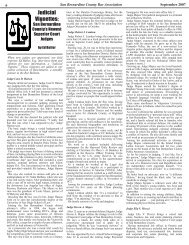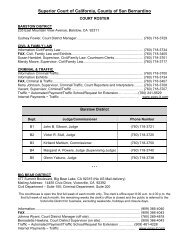October 2010 - San Bernardino County Bar Association
October 2010 - San Bernardino County Bar Association
October 2010 - San Bernardino County Bar Association
You also want an ePaper? Increase the reach of your titles
YUMPU automatically turns print PDFs into web optimized ePapers that Google loves.
10 <strong>San</strong> <strong>Bernardino</strong> <strong>County</strong> <strong>Bar</strong> <strong>Association</strong> <strong>October</strong> <strong>2010</strong><br />
Judicial Council Request For Interest:<br />
Civil Representation Services<br />
The California Judicial Council<br />
Administrative Office of the Courts is<br />
soliciting Letters of Interest from qualified<br />
legal services organizations for funding<br />
to provide legal representation in civil<br />
cases to qualified low income persons<br />
under the Sargent Shriver Civil Counsel<br />
Act. The deadline to submit the letter of<br />
interest is November 5. Information can<br />
be found at the following website:<br />
http://serranus.courtinfo.ca.gov/programs/<br />
grants/documents/shriveract-memorandum.pdf<br />
The Sargent Shriver Civil Counsel Act<br />
The Sargent Shriver Civil Counsel Act<br />
(AB 590 (Feuer), Stats. 2009 Ch. 457)<br />
provides that commencing in fiscal year<br />
2011–2012, one or more pilot projects<br />
selected by the Judicial Council will be<br />
funded to provide legal representation<br />
to low-income parties on critical legal<br />
issues affecting basic human needs. The<br />
pilot projects will be operated by legal<br />
services nonprofit corporations working<br />
in collaboration with their local superior<br />
courts.<br />
The purpose of the pilot projects is to<br />
improve timely and effective access to<br />
justice in civil cases and thereby avoid<br />
undue risk of erroneous court decisions<br />
resulting from the nature and complexity<br />
of the law in the specific proceeding or<br />
the disparities between parties in legal<br />
representation, education, sophistication,<br />
language proficiency, and access to<br />
self-help or alternative dispute resolution<br />
services.<br />
Selected legal services agencies will<br />
provide representation to low-income<br />
Californians who are at or below 200<br />
percent of the federal poverty level and<br />
need representation in one or more of the<br />
following areas:<br />
• Housing-related matters;<br />
• Domestic violence and civil harassment<br />
restraining orders;<br />
• Elder abuse;<br />
• Guardianship of the person;<br />
• Probate conservatorship; or<br />
• Child custody actions by a parent<br />
seeking sole legal or physical custody of<br />
a child, particularly where the opposing<br />
side is represented.<br />
Among the highest priorities will be<br />
pilot projects that provide representation<br />
in child custody cases. Up to 20% of<br />
available funding shall be allocated for<br />
pilot projects that provide representation<br />
in child custody cases.<br />
Each pilot project must be a partnership<br />
between the court, a legal services agency<br />
that shall serve as the lead agency for case<br />
assessment and direction and other legal<br />
services providers in the community.<br />
To the extent practical, legal services<br />
agencies must make use of pro bono<br />
services from attorneys.<br />
Selected court partners will be<br />
required to implement improved court<br />
procedures, training, case management<br />
and administration methods, and best<br />
practices to ensure that unrepresented<br />
parties in the proposed case types have<br />
meaningful access to justice, to guard<br />
against the involuntary waiver or other<br />
loss of rights in the selected legal areas<br />
or the disposition of cases by default<br />
or without appropriate information and<br />
regard for potential claims and defenses,<br />
and to encourage fair and expeditious<br />
voluntary dispute resolution, consistent<br />
with principles of judicial neutrality.<br />
Selection Requirements and Process<br />
Pilot projects must be a partnership of<br />
a lead legal services nonprofit corporation<br />
which meets the requirements of Bus. &<br />
Prof. Code, § 6213(a), the superior court,<br />
and other legal services providers in<br />
the community. Each pilot project will<br />
be required to form a local advisory<br />
committee to include representatives<br />
from the bench and court administration,<br />
the lead legal services agency and the<br />
other agencies that are part of the pilot<br />
project. These entities will submit a joint<br />
application through a competitive request<br />
for proposals (RFP) process administered<br />
by the Judicial Council. It is anticipated<br />
that the RFP will be released in December<br />
<strong>2010</strong>.<br />
Project Roles and Responsibilities<br />
The lead legal services agencies will<br />
provide case assessment and direction,<br />
including providing representation<br />
to eligible individuals or contracting<br />
with other legal services providers in<br />
the community to provide services to<br />
individuals. In so doing, the lead agency<br />
must make use of available pro bono<br />
services to the extent it is practical. The<br />
lead legal services agency also will be<br />
the central point of contact for referrals<br />
emanating from the court and other<br />
agencies providing services through the<br />
pilot and will make determinations of an<br />
individual’s eligibility for services based<br />
on uniform criteria. When both parties<br />
to a dispute are financially eligible for<br />
services, the lead agency must evaluate<br />
representation for both parties and<br />
have referral protocols in place to<br />
other agencies or private attorneys for<br />
conflicts.<br />
Judicial Council Committee<br />
The Chief Justice has appointed<br />
an Implementation Committee with<br />
representation from key stakeholder<br />
groups, including judicial officers and<br />
legal services providers. This committee<br />
will make recommendations on which<br />
projects should be funded to the Judicial<br />
Council.<br />
Selection Criteria<br />
The committee will select projects to<br />
recommend to the Judicial Council based<br />
on whether the persons to be assisted<br />
are likely to be opposed by a party who<br />
is represented by counsel. Additional<br />
factors to be considered include:<br />
• The likelihood that representation will<br />
tend to affect whether a party prevails or<br />
otherwise obtains a significantly more<br />
favorable outcome in a matter in which<br />
that party might otherwise have judgment<br />
entered against them or be deprived of the<br />
basic human need at issue;<br />
• The likelihood of reducing the risk of<br />
erroneous court decisions;<br />
• The nature and severity of potential<br />
consequences for the unrepresented party<br />
if representation is not provided;<br />
• The possibility that providing legal<br />
services might help reduce social service<br />
costs;<br />
• The unmet need for legal services in<br />
the geographic area to be served; and<br />
• The availability and effectiveness<br />
of other types of court services, such as<br />
self-help.<br />
The committee will assess the<br />
applicants’ capacity for success,<br />
innovation and efficiency, including,<br />
but not limited to, the likelihood that<br />
the project would deliver quality<br />
representation in an effective manner<br />
that would meet critical needs in the<br />
community and address the needs of the<br />
court with regard to access to justice and<br />
calendar management. The committee<br />
will also assess whether the legal services<br />
organizations and the courts have the<br />
technological capability to provide data<br />
for the evaluation that is required by AB<br />
590.<br />
Timeline and Funding<br />
Pilot projects will start in fiscal year<br />
2011–2012 and be initially authorized<br />
for a three-year period, subject to<br />
renewal by the Judicial Council. New<br />
projects may subsequently be added<br />
by competitive grants if funds become


